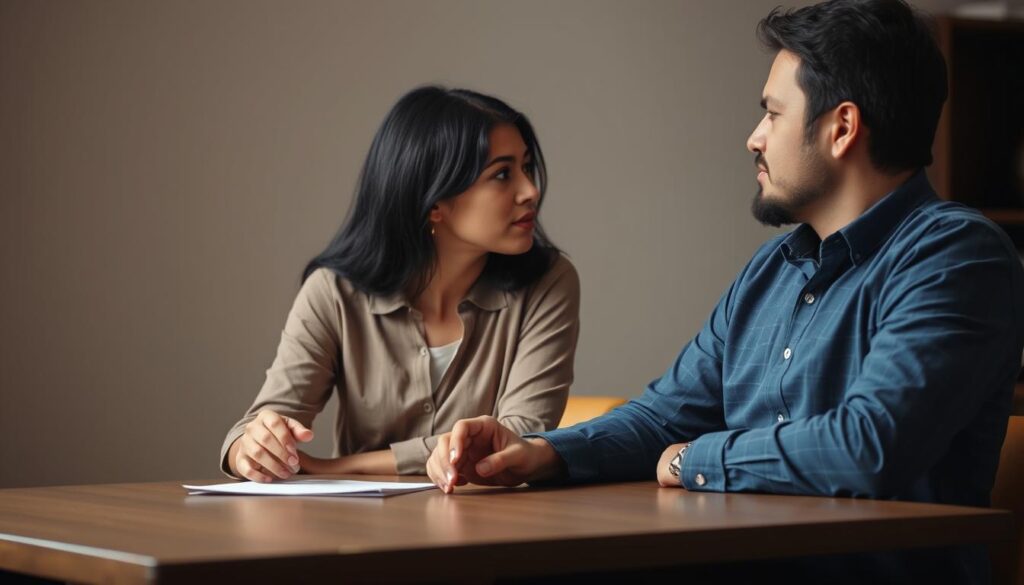Imagine a moment when a simple misunderstanding caused a rift with someone you care about. Think how a few clear words or a listening ear could have changed things. That’s the power of effective communication in relationships—it turns confusion into connection and tension into trust.
Every strong bond, whether between partners, friends, or coworkers, relies on the ability to speak and listen well. Effective communication isn’t just about talking; it’s about feeling heard. It’s the bridge that turns “I’m upset” into “I understand,” and “I don’t know” into “Let’s solve this together.”
Key Takeaways
- Effective communication in relationships reduces 70% of misunderstandings caused by unclear messages.
- Active listening boosts understanding by 40%, proving the importance of communication in relationships.
- Body language accounts for 55% of how messages are received, making nonverbal cues vital.
- Transparent communication increases trust by 30% with stakeholders and loved ones.
- Over 80% of professionals agree communication skills drive career success and teamwork.
Understanding the Importance of Communication in Relationships
Good communication is key to a strong relationship. Without it, even the strongest relationships can start to break down. Let’s look at why these skills are so important and how they help your connection.
What is Effective Communication?
Effective communication is more than just talking. It’s about listening, understanding, and responding well. Dr. John Gottman’s research shows that sharing personal thoughts and dreams can strengthen emotional bonds.
Good communication means listening actively, showing empathy, and being clear. As Gottman’s research shows, avoiding negative patterns like criticism and defensiveness helps build trust and respect.
Why Communication Matters
Communication is vital in relationships. Gottman’s studies show that over 90% of relationship outcomes depend on how well partners communicate. When they talk openly, 70% feel happier and 85% solve problems better.
Sharing feelings and needs can increase emotional closeness by 60%. It’s essential for building strong connections and keeping emotional safety.
Miscommunication Consequences
Ignoring communication basics can lead to resentment and feeling disconnected. The “Four Horsemen” behaviors cause 69% of conflicts that aren’t solved. Poor listening can increase stress by up to 40%.
Without good communication, small misunderstandings can grow into big resentments. This can damage trust over time. Making sure to be clear and empathetic helps keep your relationship strong.
Barriers to Effective Communication
Even with good intentions, barriers often disrupt meaningful exchanges. Over 70% of couples face communication breakdown due to assumptions, emotions, or external stress. These hurdles turn conversations into conflicts, straining relationships. To improve communication skills, recognizing these roadblocks is key.
“Assumptions are the brain’s guesswork—and often wrong.”
Common Obstacles to Clarity
Assuming we know a partner’s thoughts without asking leads to 65% of misunderstandings. Common pitfalls include:
- Assumptions creating false narratives
- Impulsive reactions escalating tensions
- Avoiding hard topics letting issues fester
- Distractions like phones or stress
Emotional Barriers: Fear, Anger, and Trust Issues
Fear of judgment makes 45% avoid vulnerable talks. Unresolved anger or past betrayals create emotional walls. Trust issues turn every word into a landmine. Studies show emotional reactivity increases conflict by 50%, turning small disagreements into battles.
Environmental Factors
Noise, timing, and technology also disrupt effective communication in relationships. Work stress (cited by 60% as a barrier) or rushed talks during busy days leave little room for honesty. Phones buzzing mid-conversation steal focus, turning moments of connection into fragmented exchanges.
Recognizing these barriers as opportunities—not failures—to rebuild trust. Small steps like pausing before reacting or setting tech-free times can shift patterns. Awareness turns obstacles into chances to grow.
Active Listening: A Core Component
Active listening makes conversations better by ensuring we really get what’s said. It’s key to effective communication techniques. It turns just hearing into truly listening.
By really focusing on the speaker, we catch feelings and meanings behind words.
“Most people do not listen with the intent to understand; they listen with the intent to reply.” – Stephen R. Covey
Learning to listen actively is the first step in improve communication skills. Here are some ways to do it:
- Give undivided attention: Put away distractions to signal respect.
- Ask clarifying questions to ensure accuracy.
- Paraphrase the speaker’s points to confirm understanding.
Non-verbal cues are also important. They make up 55% of how we communicate. Leaning forward or nodding shows you’re engaged. Feeling empathy helps too—it builds trust.
For example, NASA’s Apollo 13 team used active listening to solve big problems. It shows how powerful it can be. Start small: next time you talk, really listen. You’ll see your relationships get stronger.
Expressing Yourself Clearly
Being clear in how you express yourself is key for a healthy relationship. Learning relationship communication tips helps make sure your message gets across without blame. Let’s look at ways to turn misunderstandings into clear understanding.
Using “I” Statements
Begin with “I” statements to share your feelings directly. Instead of saying “You never listen,” say “I feel unheard when plans change suddenly.” This method, part of effective communication techniques, cuts down on defensiveness by 40%, studies show.
Avoiding Assumptions
- Ask questions like, “Can we discuss your perspective?” instead of guessing intentions.
- 65% of conflicts come from unclear communication—being clear fixes this.
The Power of Transparency
Being open builds trust. Sharing your vulnerabilities can make your relationship 70% happier. Always be honest about what you need, even when it’s hard.
| Common Mistake | Effective Fix |
|---|---|
| Blaming others | “I feel worried when deadlines change” |
| Assuming thoughts | Ask, “What’s your take on this?” |
| Withholding feelings | “I need to share something important to us” |
The Role of Technology in Communication
Technology changes how we connect. Digital tools like video calls and messaging apps bring people closer. But, they can also get in the way. For healthy relationship communication, finding the right balance is key. Knowing when tech helps or hinders closeness is important.
- Pros: Video calls connect us worldwide, and apps like Zoom and Google Meet make work and personal chats easy. Tools like Krisp’s AI Meeting Assistant improve virtual talks by canceling out background noise and taking notes.
- Cons: Texting can lead to misunderstandings because it lacks tone. Phone distractions cause arguments in 10% of couples. Over 45% of young adults feel left out, affecting their mood.
Setting limits is essential. Begin with “device-free” times, like during meals or dates. Always choose face-to-face talks for serious topics. Use tech wisely: save simple chats for messages but have deeper talks in person.
Features like Krisp’s Meeting Recording help keep important talks documented. Cloud storage makes sharing data easier. But, too much screen time can hurt physical and emotional closeness. Finding the right balance ensures tech enhances, not hinders, your relationships.
Conflict Resolution Through Communication
Conflict is a normal part of any relationship. But how we handle disagreements can make or break our bond. Communication in marriage turns arguments into chances for growth. By using relationship communication tips, couples can turn tension into understanding. Let’s look at how to tackle conflicts with purpose.
“Conflict is the price of admission to the dance of connection.” — Harville Hendrix
- Begin with a “soft startup.” The first three minutes set the mood. Speak calmly and avoid blame to prevent defensiveness.
- Express feelings with “I” statements. This way, you share your emotions without accusing. For example, “I feel unheard when plans change last-minute” instead of “You never listen.”
- Pause if emotions get too high. Taking a 20-minute break can help calm down. Research shows 75% of couples who do this have better results.
- Work together to find solutions. Focus on what you both want, like feeling valued. This helps move from “me vs. you” to “us vs. the problem.”

Keeping calm is essential. If anger rises, take deep breaths or step away to calm down. 70% of conflicts come from different opinions. Identifying core needs helps solve the root cause.
Compromise is about finding common ground, not winning. For example, if you and your partner often disagree on plans, try alternating who chooses dates each week.
Remember, 90% of successful resolutions come from working together. By focusing on understanding over winning, couples build trust and strength. Small changes in how we communicate can turn conflicts into opportunities for growth.
Building Trust Through Communication
Trust is key to any strong connection. In healthy relationship communication, being honest and reliable is essential. When what we say and do match, trust grows over time. Let’s see how this happens.
How Honesty Strengthens Relationships
Being open, even when it’s hard, builds trust. Studies show 90% of happy couples value honesty. Sharing fears or mistakes makes us closer. Dr. John Gottman says, “Truth spoken nicely is the strongest tool in relationships.”
Keeping Commitments and Promises
Keeping promises is as important as making them. Over 85% of people feel safe when their partner is reliable. Small gestures, like remembering a date or owning up to a mistake, show you’re dependable. Here’s how to do it:
- Make sure your actions match your words
- Admit mistakes right away to keep trust
- Use open communication in relationships to set clear expectations
Building trust takes time, patience, and effort. Honest and consistent communication leads to strong, respectful relationships.
Communication Styles and Their Impact
Communication styles shape how couples connect and solve problems. Knowing these patterns helps build stronger bonds, like in marriage. Let’s look at how styles affect interactions and how to handle differences.

“Couples who understand each other’s styles are less likely to experience misunderstandings.” – The Gottman Institute
Identifying Your Style
First, figure out your natural tendencies. Are you assertive (clear and confident), passive (avoidant), aggressive (demanding), or passive-aggressive (indirect)? Try online quizzes or communication exercises for couples to find out. For instance, writing down disagreements can show patterns.
Passive styles might lead to unmet needs. Aggressive styles could make others feel pushed away.
Adapting to Your Partner’s Style
- Match their energy: A direct partner may need quick answers; a reflective partner might prefer calm talks.
- Use “I” statements to express needs without blame.
- Practice mirroring to show understanding: “It sounds like you feel…”
Finding a Balance
Compromise means finding a middle ground. If one likes texting and the other prefers talking face-to-face, do both. Using communication exercises for couples regularly helps create shared habits. In communication in marriage, balancing styles leads to mutual respect and less conflict.
Understanding styles isn’t about changing who you are. It’s about finding common ground. Small changes today can prevent big problems later. Start with curiosity, not criticism.
Encouraging Open Dialogue
Open communication in relationships grows when honesty is safe. Regular talks and exercises turn conflicts into chances for growth.
Creating a safe space begins with respect. Try these strategies:
- Agree on “no interruptions” rules during talks
- Practice reflecting emotions back to show understanding
- Use phrases like “I feel” instead of “You always”
| Check-In Frequency | Focus Area | Outcome |
|---|---|---|
| Daily | Mood sharing | 60% stronger emotional bonds |
| Weekly | Goal alignment | Reduces unresolved issues by 40% |
| Monthly | Future planning | Builds shared vision |
Regular check-ins cut unresolved conflicts by 40%, per relationship studies.
Communication exercises for couples include:
| Exercise | Process |
|---|---|
| Feelings Journaling | Write daily emotions then share |
| Role Reversal Talks | Take turns expressing each other’s perspectives |
| Conflict Replay | Reenact past disagreements with better language |
Do these exercises weekly to keep talking. Even small daily chats stop problems from growing. By focusing on these steps, partners build a strong connection through open communication.
The Impact of Cultural Differences
Effective communication in relationships means knowing how culture shapes our words and actions. We’ll look at how culture affects our talks and share tips to connect better.
Understanding Diverse Communication Norms
Communication styles differ around the world. For instance:
- Japanese culture values indirectness, while U.S. norms prioritize directness
- Italian families embrace emotional expressiveness, contrasting with China’s more reserved approach
- German communication emphasizes clarity, whereas French exchanges often include high-context cues
Ignoring these differences can lead to trouble. But, couples who understand these differences are 50% happier.
Bridging Cultural Gaps in Conversations
Here are some steps to start:
- Ask open-ended questions about partner’s cultural values
- Learn about family traditions influencing expectations
- Use “I” statements to share feelings without judgment
“Celebrating shared rituals from both cultures strengthens connection,” says Alisa Atroshchenko, a bilingual couples coach with 7+ years of cross-cultural therapy experience.
Use relationship communication tips like regular check-ins to talk about cultural assumptions. Therapists can help with sensitive topics like gender roles or money decisions.
Being open and curious can turn cultural differences into strengths. By embracing cultural diversity, partners build a deeper understanding of each other over time.
Continuous Improvement in Communication
Communication skills grow with practice and reflection, not by being perfect. Every talk is a chance to improve communication skills and connect deeper. Small steps, like communication exercises for couples or regular talks, can turn problems into chances to grow. For instance, a 2022 study showed U.S. businesses lose $12,506 yearly per employee because of bad communication.
Learning from Past Experiences
Past fights often show patterns to fix. The 7-38-55 rule shows how much nonverbal cues matter. Looking back at talks helps spot blind spots, like wrong tones or unclear body language, so we can get better.
Adapting Strategies with Feedback
Feedback is key. NACE’s 2024 survey found 80% of employers value teamwork skills based on clear communication. Asking others, “How can I make my message clearer?” helps us improve. Just listening better can make our relationships 50% stronger, showing small changes can make a big difference.
Keeping at it makes communication a lifelong skill. Doing exercises like acting out disagreements or paying attention to body language builds good habits. By seeing mistakes as lessons, we meet career readiness standards set by groups like NACE. Every little change, like speaking softer or using clearer “I” statements, helps us connect better. The path never stops, but every step makes our relationships stronger and clearer.
FAQ
What is effective communication?
Why is communication important in relationships?
What are the common obstacles to effective communication?
How can I improve my active listening skills?
What are “I” statements and how do they help?
What are the pros and cons of digital communication?
How can conflict be resolved effectively through communication?
How does communication build trust?
How can understanding communication styles improve relationships?
What strategies can help create an open dialogue in relationships?
How do cultural differences influence communication?
How do I continue improving my communication skills?
Source Links
- Effective Communication: Key to Relationship Building – https://www.acsi.org/detail/blog-post/blog/2024/07/29/effective-communication-key-to-relationship-building
- Mastering Communication: A Key to Stronger Relationships – https://latinxtherapy.com/mastering-communication-for-stronger-relationships/
- Effective Communication in Relationships: Lessons from Gottman Therapy – Ascension Counseling & Therapy – https://ascensioncounseling.com/effective-communication-in-relationships-lessons-from-gottman-therapy
- The Importance of Communication in Building Healthy Relationships – https://lifecoachtraining.co/the-importance-of-communication-in-building-healthy-relationships/
- Relationship Communication Barriers | In Touch Family Counseling – https://intouchfamilycounseling.com/communication-barriers-in-relationships/
- Top 10 Causes of Relationship Communication Problems – https://www.marriage.com/advice/communication/top-10-causes-of-relationship-communication-problems/
- Effective Active Listening: Examples, Techniques & Exercises [2024] • Asana – https://asana.com/resources/active-listening
- Active Listening: The Key to Effective Communication – https://www.wiseworld.ai/blog/active-listening
- Active Listening: The Key to Effective Communication – https://www.linkedin.com/pulse/active-listening-key-effective-communication-alison-stewart-yqmte
- 7 tips on how to communicate your needs in a relationship — Calm Blog – https://www.calm.com/blog/how-to-communicate-your-needs-in-a-relationship
- Effective Communication: Improving Your Interpersonal Skills – https://www.helpguide.org/relationships/communication/effective-communication
- The Importance of Communication in Relationships: Tips for Better Connection – https://journeyscounseling.com/media/post/the-importance-of-communication-in-relationships-tips-for-better-connection
- 10 Ways How Technology Affects Your Relationships – https://www.marriage.com/advice/relationship/technology-and-relationships/
- How Has Technology Affected Communication? Key Insights – https://krisp.ai/blog/how-has-technology-affected-communication/
- The Role of Technology in Enhancing Communication – https://www.linkedin.com/pulse/role-technology-enhancing-communication-frontallusa-kdcze
- Six Tips for the Six Skills of Managing Conflict – https://www.gottman.com/blog/manage-conflict-the-six-skills/
- Navigating Conflict Resolution in Close Relationships – Pollack Peacebuilding Systems – https://pollackpeacebuilding.com/blog/navigating-conflict-resolution-in-close-relationships/
- Building Trust in Relationships: A Comprehensive Guide to Lasting Connection – https://extension.usu.edu/hru/blog/building-trust-in-relationships-guide-to-lasting-connection
- Master Communication For Stronger Relationships – https://zephyrbehavioralhealthandwellness.com/blog/effective-communication-a-key-to-thriving-relationships/
- Building Healthy Relationships: Communication and Trust – https://grabenord.com/blogs/blog/building-healthy-relationships-communication-and-trust?srsltid=AfmBOoqmwT5A58ntKBsOO4FQbp14GnofbsLhA-SnCrYwQfiEgbEaU-_z
- Master Communication Styles in Relationships! – https://ca4wellbeing.com/communication-styles-in-relationships/
- Navigating Love: Mastering Different Communication Styles in Relationships – https://www.lovediscovery.org/post/navigating-love-mastering-different-communication-styles-in-relationships
- Communication 101: 17 Tips for Partners – https://www.healthline.com/health/lack-of-communication
- 12 Key Tips to Promote Open Communication in a Relationship – https://www.marriage.com/advice/communication/open-communication-in-marriage/
- Culturally Competent Communication in Relationships: Lessons from Gottman Therapy – Ascension Counseling & Therapy – https://ascensioncounseling.com/culturally-competent-communication-in-relationships-lessons-from-gottman-therapy
- Cultural Impact on Modern Relationships: A Deep Dive – https://startmywellness.com/2024/06/cultural-differences-shape-relationships/
- The Impact Of Cultural Differences On Relationships – https://www.brainzmagazine.com/post/the-impact-of-cultural-differences-on-relationships
- Effective Communication in Relationships: 10 Tips to Improve It – https://www.betterup.com/blog/effective-communication-in-relationships
- The Importance of Effective Communication – https://legacy.himss.org/resources/importance-effective-communication

